Cowpoke Surge
It’s time to say it straight (and I don’t mean that as a pun): Ang Lee’s Brokeback Mountain (Focus Features, 12.9) is the movie to beat in the Best Picture race this year.
I’m not saying it will win or lose, but it’s the one film everyone in the country will be talking about over the next five or six weeks and deciding where they stand deep down. And it’s safe to say that a lot of convictions about this film will go far beyond issues of cinematic criteria.
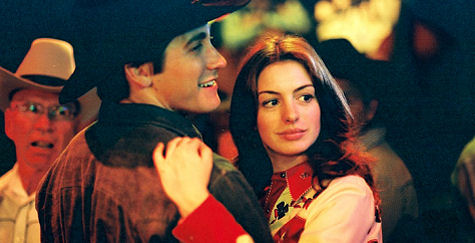
On the brink of a dishonest marriage: Jake Gyllenhaal, Anne Hathaway in Ang Lee’s Brokeback Mountain (Focus Features, 12.9)
The bottom line is that Brokeback Mountain is the only year-end prestige film that people are weeping over, and that matters. On top of which it has a simple philoso- phical theme (i.e., ignore the pleadings of your heart at your own peril), which all Best Picture winners tend to have.
This is mostly a gut feeling, but I’ve called around a bit and it’s the one film that seems to be truly gathering steam within L.A. and N.Y. screening circles (except for certain conservative harumphers and macho conquistadors) as an enlightened stand-out.
It’s the classiest tearjerker. The most bravely made. The year’s one big deck-re- shuffler. The stand-alone-under-a-lonely-nightscape movie that did something new and head-turning. A film that brought a sense of real compassion and vulnerability to the table, and is sure to goad anyone who sees it into a deeper understanding of what comprises human tragedy.
< ?php include ('/home/hollyw9/public_html/wired'); ?>
I haven’t conducted any kind of scientific poll, but I’m hearing that Academy mem- bers are saying to each other than Brokeback Mountain is an almost-certain Best Picture nominee, which confirms what I’ve long believed would eventually happen anyway.
But I have to acknowledge something else, however reluctantly, which is that there are people out there who are not on the team and never will be.
Brokeback Mountain is at heart an emotionally shielded and heterosexual-attitude piece about two rugged western guys named Jack Twist (Jake Gyllenhaal) and En- nis del Mar (Heath Ledger) who fall in love with each other in their early 20s and spend the rest of their lives feeling all screwed up about it.
They both get married and have kids and take a stab at conventional domesticity while continuing to get together for “fishing trips” now and then. But the denial fes- ters and eats away. Ledger’s gruff, emotionally plugged-up cowhand is especially unable to act on his feelings for Twist in any lasting way, and all kinds of bad stuff kicks in down the road.
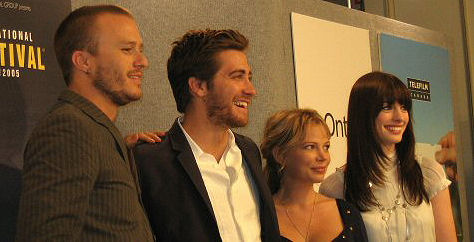
Brokeback Mountain‘s Heath Ledger, Jake Gyllenhaal, Michelle Williams and Anne Hathaway at Toronto Film Festival press conference for the film.
My repeated promises that this film isn’t gay are getting tiresome, but it really and truly isn’t. But those nagging impressions about it being a “gay cowboy” movie aren’t going to go away, and the more recent (and catchy) “gay Gone With the Wind” label is going to stick also.
And I’m afraid…I’ll just spit it out…that homophobia and closet bubba-ism (which is a bigger factor than some of us may realize) are going to start elbowing their way into the Brokeback Mountain conversation over the next several weeks.
I’ve been picking up indications of resistance in letters here and there…just hints and simmerings (following this article is a letter from a 26 year-old Milwaukee guy who’s been picking up a certain vibe when the trailer plays)…but I’m starting to sense there may be more where this comes from.
And I’d be kidding myself if I didn’t admit to the possibility of a subterranean, grumpy-straight-male, anything-but-Brokeback groundswell. If there’s enough heft behind this, there’s a chance that the scales could tip against Lee and producer James Schamus and everyone who loves and supports this film.
The fact that Matt Drudge, a conduit of conservative opinion but also a guy with a very sharp nose for what’s happening in the hinterlands, has run at least two uh-oh items about Brokeback Mountain… this is a significant barometric reading.
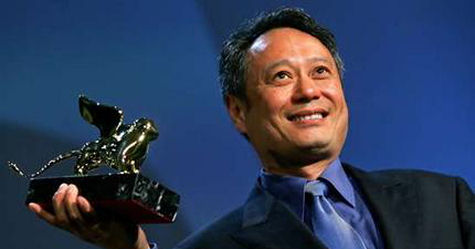
Brokeback Mountain director Ang Lee after winning the Golden Lion at last September’s Venice Film Festival
Focus Features wants to take the high road and I understand that, but The Battle of Brokeback Mountain is starting to take shape, and will fundamentlally be about whether people can look beyond their personal agendas and aversions and look into the fundamental truths contained in its story.
The more I consider the competition, the more I’m persuaded that no other film has come close to staking out, much less laying claim to, the emotional turf occupied by Brokeback Mountain.
The issue of whether or not it will gather more support than Steven Spielberg’s Munich, which my ass-teletype and insect-antennae readings keep telling me is going to be received in a couple of weeks’ time as a pretty good film but which has almost no chance of being this year’s Million Dollar Baby, is almost moot at this stage.
How can I say that? What do I know? But just wait.
The older ooh-ahh crowd…the journalists and Academy members who voted or campaigned for Rob Marshall’s Chicago two years ago…seem to be lining up behind Memoirs of a Geisha, and already I can see this emerging as a possible anything-but-Brokeback alternative (although I gag at the thought).
Capote is a sublimely haunted film that gets better every time you re-see it or think back on it. The New World will almost certainly be a compositional stunner (and perhaps more). Crash broke through and found its audience and deserves an industry-wide salute. And The Constant Gardener is thrillingly crafted piece that fuses the emotional and political into a kind of African third-world symphony.
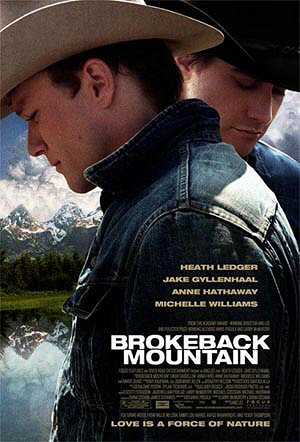
But Brokeback Mountain is the daddy…the one movie with a grip on a profound human truth that we all recognize.
This is what we’re all sitting on…the rumble of mid-November. And the question seems to be whether or not the resistant types out there will summon the char- acter to overcome their macho chortlings about the cornholing-in-the-tent-on-the- fishing-trips, and find the calm and coolness that will allow them to be big-hearted and open-hearted enough to…fuck it…let this film in.
We’re all lonely. We’ve all let chances at happiness slip through our fingers. Life is so damn short it’s not funny. What we feel in our hearts we’d better damn well act upon, or we’ll sure as shit feel the consequences down the road.
Attaboy
Thanks to Buffalo News columnist Greg Connors for giving me and this column a plug in last Monday’s edition.
Milwaukee, Baby
“I’m starting to worry about Brokeback Mountain‘s appeal in Milwaukee and surrounding environs. I live in Milwaukee and we have two Landmark theatres here — the Oriental and the Downer. And the trailer for BBM has been playing for a month or so in front of most films at both theaters, and I’ve seen it about four or five times within that time period.
“Though the audience is pretty typical for an art house/indie theatre, reactions have not been positive. Each time I’ve felt something like confusion, followed by the reali- zation that it’s ‘the gay cowboy movie.’ followed by either snickering or outright laughter. It seems like people don’t know what to make of it.
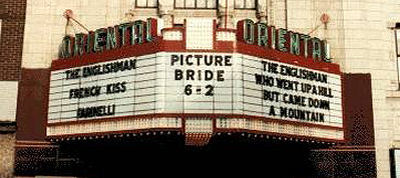
Landmark’s Oriental theatre in Milwaukee, haven to a group of Brokeback snickerers whose numbers are undetermined.
“I know the people I was at the theatre with snickered. Some had heard of it and some had not. But when they realize that it’s a love story between two cowboys, they laugh…regardless of whether or not they had heard of it.
“Not that I’d know how to sell it any better than Focus has. I hope I’m wrong. I think it looks great and I can’t wait to see it.
“I am 26. I would say that the snickerers in the audiences I’ve seen the trailer with are on the younger side. Maybe younger viewers just aren’t interested in Brokeback Mountain and that’ll be that.” — Paul Doro, Milwaukee, WI.

Another place for chortlers and snickerers to congregate
Young-male aversion to the trailer is mentioned in Sean Smith’s currently-running Newsweek story about Brokeback Mountain.
By way of Smith, producer James Schamus addresses the guys who are laughing at the trailers: ‘If you have a problem with the subject matter, that’s your problem, not mine,’ he says. ‘It would be great if you got over your problem, but I’m not sitting here trying to figure out how to help you with it.’
Smith also reports, “In an early meeting, Schamus told Lee that, from a marketing standpoint, they were making this film for one core audience. ‘Yes, of course,’ Lee said. ‘The gay audience.’ No, Schamus said. ‘Women.'”
Cash It
Editor’s note: I’m re-running the review I ran last September about Walk the Line because it opens tomorrow on Friday, 11.18.]
Walk the Line (20th Century Fox, 11.18) is a frank, straight-from the-shoulder bio- pic about the late Johnny Cash, and I’m cool with it and admire it in most of the ways that usually count.
For above all (and because there are many pleasures in the way it unfolds), Walk the Line is a solid, strongly composed thing — cleanly rendered and always touch- ing the bottom of the pool.
Just as George Clooney’s Good Night, and Good Luck plays, appropriately, like a live 1950s TV drama, Walk the Line is constructed and delivers like a good Johnny Cash song…no b.s., down to it, hurtin’ feelings, etc.
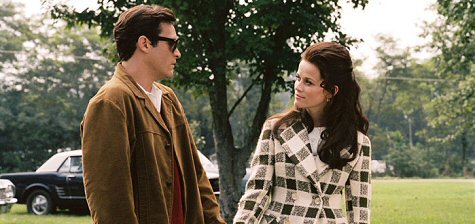
Walk the Line costars Joaquin Phoenix (as Johnny Cash) and Reese Witherspoon (as June Carter)
It’s easily Mangold’s best film ever, and from the guy who directed Girl Interrupted, the respectable Cop Land, the unsettling Identity, the nicely composed Kate & Leopold and the excellent Heavy, that’s saying something.
And you can definitely take Joaquin Phoenix and Reese Witherspoon’s performances as Cash and the apple of his eye, June Carter, to the bank. They’re both spot-on…fully believable, living and breathing on their own jazz, and doing their own singing and knocking down any resistance or concerns you might have about either one being able to inhabit or become the real deal.
Phoenix is a lock for a Best Actor nomination, and Witherspoon for a Best Actress nom — no question.
You will not in any way feel burned by this movie, and in many ways it will leave you with a feeling of finely-honed honesty and conviction…isn’t that the bottom line?
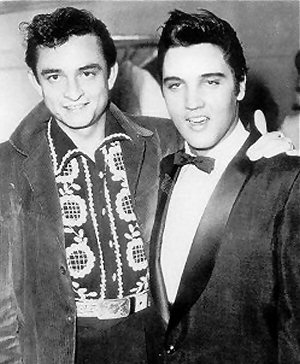
Johnny Cash and Elvis Presley, backstage after a show they gave in ’56.
At the same time I have to be dirt straight and say that the story of the film, which can basically be boiled down to “when will Johnny and June finally get married?”, didn’t exactly throttle me.
Walk the Line is very austere and manly, but when you look at it in sections, it’s just a standard showbiz saga progression thing…this happened, that happened, this happened, etc.
But the real reason it might run into trouble with the Academy is one that David Poland alluded to last summer, which is that Walk the Line is a bit too much like Ray…it’s too deja-vu.
Both films tell stories about a famous but flawed musical performer…the boy-born-into-southern-poverty thing, the rural hand-to-mouth upbringing, the sympathetic loving mother, the brother dying in childhood and marking the singer-to-be for life, an early marriage followed by drug abuse and infidelity, the cleanup detox scene, etc.
And frankly? It doesn’t get you emotionally all that much, although it does get you in retrospect because it feels honest and solid and doesn’t flit around. This movie never snickers or leers or tugs at your shirtsleeves — it says it plain, take it or leave it. And that grows on you.
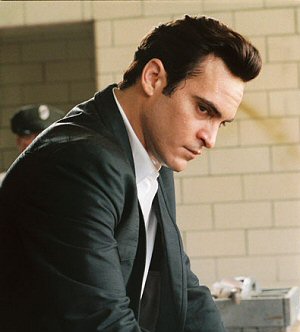
The basic arc of this thing is, when will Johnny Cash attain a state of togetherness and a lack of encumbrance due to this or that gnarly issue (drug problems, marriage to first wife, etc.) to finally win over June Carter and get her to accept his marriage proposals? When will Johnny and June finally get hitched? That’s the basic shot.
It’s not meant as a put-down, but I don’t happen to feel that this or that woman (I don’t care how beautiful or giving or strong-of-spirit she is) can save any man’s life. Happiness can only be self-created — it must come from within.
I understand and respect that Johnny felt differently and needed June like a rose needs rainwater, etc., but I couldn’t empathize.
But I did feel it…that’s the odd thing. I felt a sense of absolute completeness, of bare-boned reality and complexity…in no persistent way did Walk the Line make me feel under-nourished.
Make of this what you will. I obviously can’t figure it out myself, but I’ve tried to be true to the spirit of this film by just saying it and letting the chips fall.
Wham Bam
Cinderella Man re-opens this Friday in a bid to get people to reconsider it for Oscar nomination, and maybe to make a bit more money. The most honest thing I can do is to re-print what I wrote late last May, the morning after seeing it at the AMC Empire on 42nd Street:
It isn’t quite stupendous, but Cinderella Man is honest and earnest and has dignity and heart, and if you don’t respond to it on some deep-down human level there’s probably something you should have inside that’s not there.
It’s easily the best, most emotionally rewarding mainstream flick of the year so far, and that’s not a left-handed way of saying it’s the best application of traditional thematic uplift…although it is that, I suppose.
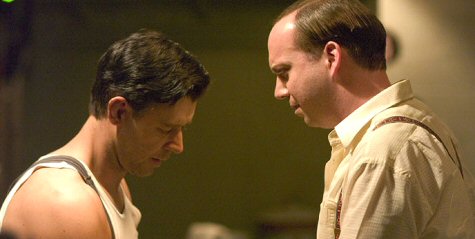
Russell Crowe as the legendary Jim Braddock, Paul Giamatti as his manager Joe Gould in Ron Howard’s Cinderella Man.
Like Seabiscuit, Cinderella Man is a 1930s Depression saga about a sports figure — an Irish boxer named James Braddock (Russell Crowe) — who was up and flush in the late 20s and then down after the 1929 crash and then fighting badly and presumed to be over…like a lot of people were assuming about themselves and even the country as a whole.
But then Braddock lucked into another chance and made good on it big-time by taking the heavyweight championship title from the formidable Max Baer, who had killed a guy in the ring and maybe another one besides (a delayed response thing), and in so doing struck a chord with working people struggling to make do in that horrible period.
The mythological similarities aside, Cinderella Man has been crafted by director Ron Howard with a good deal more poignancy and grace and laid-back confidence than Gary Ross was able to summon for Seabiscuit.
And Crowe can act circles around the horses who played Seabiscuit, and looks an awful lot like the real Jim Braddock…as far as his weight loss and genetic inheritance and the first-rate makeup allow for, I mean.
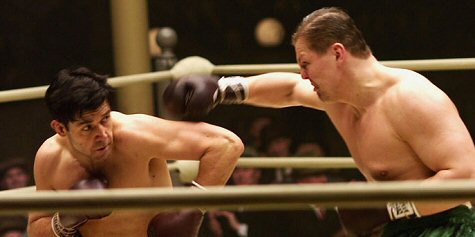
Cinderella Man also has the absolutely genius-level Paul Giamatti, who got a round of applause during the closing credits at last night’s all-media screening at Manhattan’s AMC Empire 25.
Let’s say it right here and now — Giamatti is a guaranteed lock for a Best Supporting Actor nomination next year.
It’s way too early to even think about making blanket calls about winners, but given the fact that everyone knows that Giamatti has been burned twice — last year when he wasn’t nominated for Best Actor for Sideways and the year before when the Academy ignored his American Splendor performance — he’s looking like a very heavily favored guy at this stage.
Every movie that connects with audiences says something that everyone including your grandfather recognizes as honest and true. The message of Cinderella Man, simply put, is that there’s nothing like getting heavily and repeatedly kicked in the ass (like having to deal with hopelessness and soup kitchens and bread lines, having no job, being unable to pay the electricity bill, seeing your kids go hungry) to give your life a certain focus.
What did I love about Cinderella Man the most, apart from the story and production designer Wynn Thomas’s convincing `30s milieu and Salvatore Totino’s cinematography and the pitchperfect performances? The fact that Howard hangs back for the most part and doesn’t push the emotional buttons too strongly.
I love that after an establishing prologue of six or seven minutes Howard takes things into a downer struggling mode and keeps them there for a full 45 minutes.
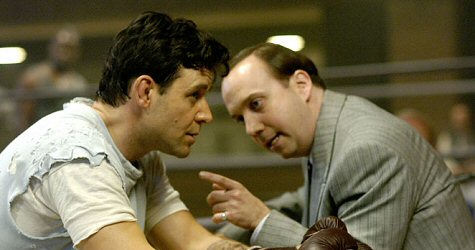
And then when the turnaround stuff finally starts to happen he doesn’t lather it and try and beat you up with it. We know that the story is a classic come-from-behind uplifter and this is why Howard is making the film, etc., but it doesn’t feel as if he’s hustling you. He’s telling a true story, after all, and holding back for the most part and just letting it come together on its own terms.
Okay, he throws in some inspirational Irish music here and there and gives us a few Ron Howard-y touches here and there, but not so you’d really notice.
Over the last few years, and particularly since he got into his 50s, Ron Howard has been getting better and better. A Beautiful Mind, The Missing (an undervalued, tough-as-nails western) and now this…perhaps the best film of his life.
Cinderella Man is longish (two hours and 20 minutes), but it doesn’t feel that way because the attention paid to this and that detail in the early sections totally pays off in the third act. Congratulations to Howard, his partner/producer Brian Grazer, and screenwriters Cliff Hollingsworth and Akiva Goldsman (A Beautiful Mind ) for deciding to let the story takes its time and in so doing imparts a certain confidence.
The climax of the down period comes when the destitute Braddock, desperate to get the power in his family’s cold-water flat turned back on, goes to a bar to beg change from his former cronies and supporters in the boxing game. It’s a painful scene, but it’s real and believable and penetrating as hell.
The five or six fight sequences are exciting and beautifully cut, and I didn’t care if they were as original as Scorsese’s Raging Bull sequences appeared back in `80.
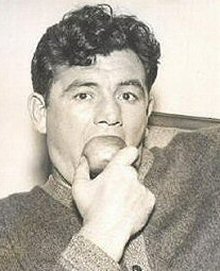
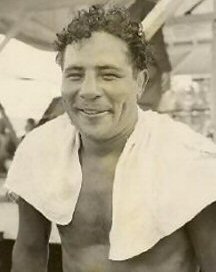
The real Jim Braddock (left) and Max Baer, in snaps taken sometime around 1934 or ’35 or thereabouts.
The big climax, which lasts about 25 or 26 minutes, depicts, of course, Braddock’s fight against the heavyweight champion Max Baer (Craig Bierko). I knew who the winner would be, obviously, but it didn’t matter because the film is so well shot and edited, blah, blah.
Crowe’s performance is an absolute home run. As Braddock’s wife Mae, Renee Zellweger gives her least tedious and off-putting performance since Jerry Maguire. (She almost made me forget about the last Bridget Jones film.)
Bierko’s Baer is a trip and a half. I loved his wild-ass expressions and goofing off in the ring, and how he flips this over in an instant and turns into a beast out for blood.
I loved Bruce McGill’s hard-nosed fight promoter character. McGill nails it every time (Collateral, Matchstick Men, The Insider) and has become one of most dependable character actors around, bar none.
I even found a place in my heart for Paddy Considine’s friend-of-Jim-Braddock character…a political activist-slash-working man….and that’s saying something given my lingering feelings about that “fee-fi-fo-fum” scene in Jim Sheridan’s In America.
War of the Wires
“The question about whether Paramount Home Video should have erased the wires in the just-out DVD of George Pal and Byron Haskin’s War of the Worlds should be simple, but it has somehow become more complex.
“The basis of any serious film restoration is now, and has always been, reference to the original. Not the original negative — the original print.
“With any production, not even specifically special-effects films, the film’s creators had a knowledge of what the shot footage would yield on a final print. Costumes, sets, make-up and special effects devices were all based upon that specific knowledge.
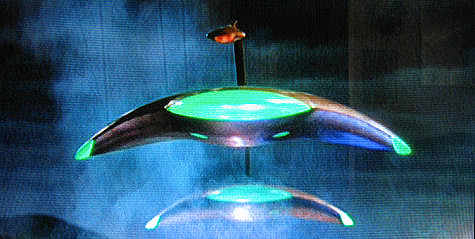
“The problems began in the late 1980s, when Kodak’s newest mastering
and print release stocks for both B & W as well as color emulsions were produced with a much finer grain structure. And make no mistake — that was a good thing.
“It began to combine in the ’90s with newer film-to-tape transfer technologies which enabled a higher resolved record of the film image.
“We saw the earliest problems on what were beautifully rendered laser discs of the Chaplin classics from Image Entertainment. The best people were brought in to go through the elements and oversee the work.
“But here’s where it gets difficult. One might make the assumption that access to an original fine grain master of, let’s say, City Lights or The Circus would be a great thing. And it was.
“But Chaplin had taken that master, and from it created a dupe printing negative from which final release prints would have been struck.
“Chaplin, a master filmmaker, knew precisely what affect optics and grain structure would have on his final product.
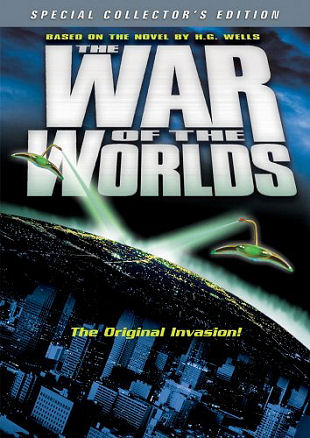
“Take away one generation and suddenly we see production artifacts like wires.
“This same thing occurred with 70mm prints of 2001: A opace Odyssey struck on the newer stocks. Because of the higher resolution, the glass holding the revolving pen on the spaceship heading to Clavius could now be easily seen in theatrical projection.
“Although I haven’t seen an original dye transfer print of WotW in decades, I can tell you that the system worked as follows.
“In 1953 Technicolor was using optics which are nowhere near the resolution of today’s scanning devices. This softened the image, yielding a more pleasant, less grainy look to the film.
“The mordant which allowed the liquid dyes to adhere to the blank stock was also slightly different than used later, and allowed a very slight softening of the grain structure.
“The final look of the print was achieved by the optics used in the creation of the printing matrices, the mordant, and the liquid dyes. The image looked perfect and brilliant on screen because of the slightly higher contrast of the Technicolor system which created a higher perceived sharpness — not actual sharpness.
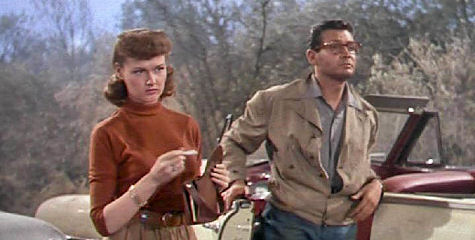
“Taking those three-strip elements today and negating everything that came between them and the final print can yield a final result which is of overall higher resolution than the original prints. Hence the quandary, and there are two camps.
“My belief is that anything that breaks the suspension-of-disbelief
between the film and the audience should be altered to look as it
did, but now within an overall image of higher resolution.
“So personally I would remove the wires, as I would remove bad matte lines which can make early effects laughable and stop a film in its tracks, making it look like an antique.” — Robert Harris, the producer-scholar who supervised the legendary photo-chemical restorations of Lawrence of Arabia, Vertigo, Spartacus, Rear Window, etc.
Fatigue Guy
“During my prior life as a Merrill Lynch stock analyst, I was quoted as saying this about Harry Potter fatigue. In the fifth paragraph from the bottom, I mean.
“And I was kind of right — each successive film has done less box office than the previous, but of course the books are still boffo.” — Dave Lichtman












